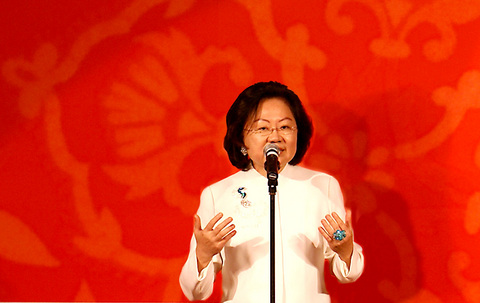The National Chiang Kai-shek Cultural Center (CKS Cultural Center) is turning 20 this year, and to celebrate the center will hold a series of performances by local and international acts at the National Theater and National Concert Hall. The center will also hold a 20-year retrospective on the evolution of Taiwan's foremost venue for the arts.
The Classic 20 series brings to the stage international heavyweights including Robert Wilson, Philip Glass and Tadashi Suzuki and musical performances by Bavarian Radio Symphony Orchestra and The German Opera of the Rhine. Performances by local groups will include Cloud Gate Dance Theater (雲門舞), Yang Li-hua Taiwanese Opera group (楊麗花歌仔戲), Performance Workshop Theater (表演工作坊) and New-Classic Dance Company (新古典舞團).
The retrospective is called Vitality Capsule of Art and will look at the dance, music, theater and opera performed at the NTCH over the past 20 years, with a view to the future.

PHOTO: NOAH BUCHAN, TAIPEI TIMES
"I hope to continue to bring international acts to Taiwan … as well as increase the profile of local artists abroad," said the recently appointed Chairperson for the CKS Cultural Center, Tchen Yu-chiou (陳郁秀), at a press conference on Thursday.
The board of directors elected the former Chairperson of the National Symphony Orchestra (NSO) and minister for cultural affairs to a three-year term.
But if this move is cause for celebration, the departure of Artistic Director, Ping Heng (平珩), leaves somewhat of a gap in the program.
After arriving in 2004, Heng oversaw the transformation of the center from a governmentally run operation to a public corporation. Though this change saw a one-third reduction in government funding for the center, the trade-off came in the fact that management was able to increase its control over content and staff.
With control over programming, Heng managed to increase the number of foreign artists holding workshops and performing in Taiwan. Recent examples include the New Circus performances given in October of 2006 and the recent lecture on the theater given by Robert Wilson in January.
But if Heng no longer works at the CKS Cultural Center, she doesn't plan on retiring. "I want to get back to my [dance] business, which I've neglected since becoming artistic director [in 2004]," she said when asked what she plans to do after leaving the NTCH.
Though programming for the center is the responsibility of Artistic Director, the majority of the performances at the National Theater and National Concert are rentals.
"Over the past three years, 30 percent [of the performances are] our own production and 70 percent are rentals," said Ann Liu (劉怡汝), deputy director of the CKS Cultural Center. This works out to 350 programs — with a total expense of roughly NT$280 million — sponsored by the NTCH, and 650 rentals.
But in terms of costs, the rental figure is slightly misleading as the fee for rentals is 30 percent lower than what it costs the NTCH. Consequently, the NTCH subsidizes the rental space.
The yearly budget to run the four theaters — the Concert Hall (2,000 seats), Recital Hall (350 seats), the National Theater (1,500 seats) and Experimental Theater (180 seats) — is roughly NT$985 million, including maintenance fees.

That US assistance was a model for Taiwan’s spectacular development success was early recognized by policymakers and analysts. In a report to the US Congress for the fiscal year 1962, former President John F. Kennedy noted Taiwan’s “rapid economic growth,” was “producing a substantial net gain in living.” Kennedy had a stake in Taiwan’s achievements and the US’ official development assistance (ODA) in general: In September 1961, his entreaty to make the 1960s a “decade of development,” and an accompanying proposal for dedicated legislation to this end, had been formalized by congressional passage of the Foreign Assistance Act. Two

Despite the intense sunshine, we were hardly breaking a sweat as we cruised along the flat, dedicated bike lane, well protected from the heat by a canopy of trees. The electric assist on the bikes likely made a difference, too. Far removed from the bustle and noise of the Taichung traffic, we admired the serene rural scenery, making our way over rivers, alongside rice paddies and through pear orchards. Our route for the day covered two bike paths that connect in Fengyuan District (豐原) and are best done together. The Hou-Feng Bike Path (后豐鐵馬道) runs southward from Houli District (后里) while the

March 31 to April 6 On May 13, 1950, National Taiwan University Hospital otolaryngologist Su You-peng (蘇友鵬) was summoned to the director’s office. He thought someone had complained about him practicing the violin at night, but when he entered the room, he knew something was terribly wrong. He saw several burly men who appeared to be government secret agents, and three other resident doctors: internist Hsu Chiang (許強), dermatologist Hu Pao-chen (胡寶珍) and ophthalmologist Hu Hsin-lin (胡鑫麟). They were handcuffed, herded onto two jeeps and taken to the Secrecy Bureau (保密局) for questioning. Su was still in his doctor’s robes at

Mirror mirror on the wall, what’s the fairest Disney live-action remake of them all? Wait, mirror. Hold on a second. Maybe choosing from the likes of Alice in Wonderland (2010), Mulan (2020) and The Lion King (2019) isn’t such a good idea. Mirror, on second thought, what’s on Netflix? Even the most devoted fans would have to acknowledge that these have not been the most illustrious illustrations of Disney magic. At their best (Pete’s Dragon? Cinderella?) they breathe life into old classics that could use a little updating. At their worst, well, blue Will Smith. Given the rapacious rate of remakes in modern